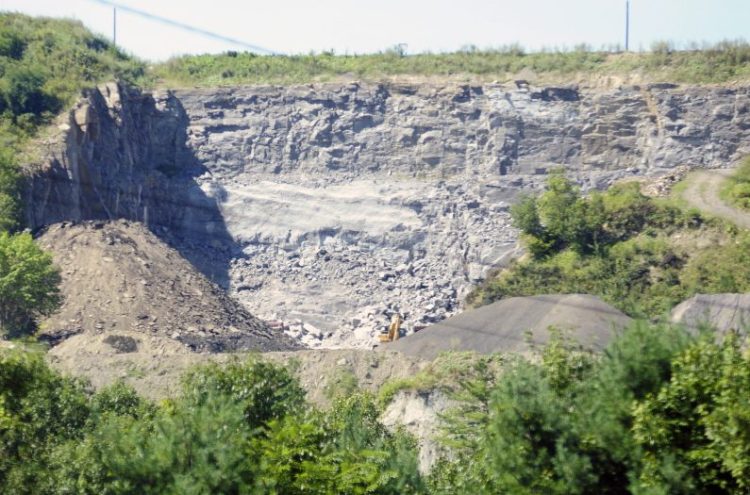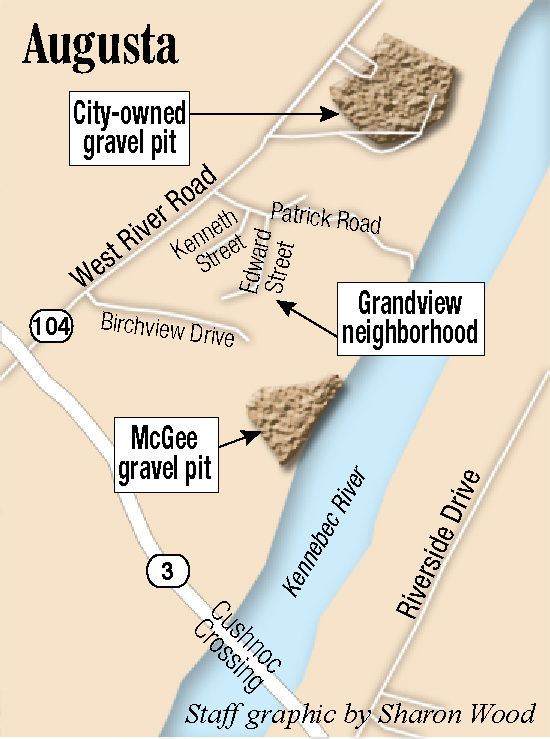AUGUSTA — The Planning Board on Tuesday renewed the mineral extraction license for McGee Construction’s controversial West River Road quarry, reducing the allowable size of blasts but otherwise permitting up to 10 blasts a year to take place at the pit that has been criticized by residents of the nearby Grandview neighborhood.
Board members voted unanimously to renew McGee’s license for another five years, with some modifications to the license, and subject to multiple conditions that must be met.
Conditions include that the license renewal would be subject to any future changes made by the Augusta City Council to either the city’s Mineral and Excavations Ordinance or Blasting Ordinance, even if those changes would place more stringent restrictions on the site.
The license was also modified to reduce the maximum allowed air blast overpressure from blasts at the site, one of two ways the magnitude of blasts at the site are measured, from 133 to 129 decibels.
Residents of the nearby Grandview neighborhood, some of whom have said the blasts have damaged their homes and their psyches, asked that the number of blasts allowed per year be reduced, from 10 to six, and also suggested blasts there should be monitored by an independent observer. They are currently measured by Maine Drilling and Blasting, the same company which does the blasting for McGee.
Board members took neither of those steps.
Resident Scott Snedden said while his home hasn’t been damaged by the blasting, neighbors closer to the pit have said theirs have been. He worries that after the 60 to 70 blasts his home has withstood over the years of blasting, it could be damaged. He noted more of his neighbors would have been at Tuesday’s meetings making similar complaints but McGee has bought multiple homes in the neighborhood, and the neighbors whose homes he bought aren’t involved anymore. He said he wants to remain in his neighborhood.
“The blasts have been, at times, overwhelming,” said Snedden, a 21-year resident of Kenneth Street in the Grandview neighborhood. “What I ask is that you reduce the magnitude of the blasts and the number of blasts. Steve (McGee, owner of McGee Construction) is a great person to work with. I consider Steve a friend. He’s a businessman and he’s looking after his business.”
Snedden said he’s retired and wants to be able to “live in peace.”
“And live together with the pit next to us, but not be wondering when is the time we’re going to be faced with some of the problems some of our other folks in the neighborhood have had, which is damages,” he said.
Planning Board members did, eventually, agree to a reduction to the maximum air blast allowed to come from blasts, but did not reduce the other measurable allowed maximum measure used by the city to judge blast magnitude, a ground vibration standard.
Board members expressed concern reducing the maximum allowed ground vibration standard could reduce the amount of rock that each blast frees up, thus requiring McGee to blast more to free up the same amount of product, which is used in the construction industry.
“By reducing the (allowable ground vibration levels) in years they might have only blasted five times, they’re blasting 10 times to get the same level of aggregate,” said Corey Vose, a board member. “For me it goes back and forth. We have inconclusive information about whether there is any damage (to homes) going on from the blasts. But what we’ve heard repeatedly over the years is the annoyance factor, the fatigue factor. If you reduce (the allowable magnitude of blasts and prompt McGee to blast more often) you run the risk of increasing the fatigue. There’s the challenge.”
A report by a blasting expert with consultant Golder Associates, requested by the Planning Board and paid for by McGee, noted the city’s decibel limit of 133 decibels was high in comparison to the state, and other municipalities, which set their limit at 129 decibels.
The report also indicated vibrations and air blasts measured by devices at locations in the Grandview neighborhood during past blasts in the quarry were lower than the industry thresholds at which damage to structures is expected to take place. The report added, however, that it is possible there are site-specific geological or structural conditions that could exist that would make homes in the neighborhood more susceptible to structural damage.
Maryalice Crofton, whose Kenneth Street home abuts the pit property, said federal soil maps indicate soil in the area is not classified as stable, and her cellar pad sits on gravel, not more stable clay or rock. She urged the city to look at the soil conditions and other geological aspects of the site, to see if they are such that blasting that might not be damaging elsewhere could be damaging homes there.
Crofton said the blasting is so bothersome to some in the neighborhood it has impacted their psyche. She said her husband is a Vietnam veteran and, to him, the blasts feel like “incoming.”
“I know it has been said it is an acceptable practice for him, when he knows there is going to be a blast, for him to leave the neighborhood for the hour or two hours that it may occur,” Crofton told board members. “I ask you to think about being asked to leave your house, your neighborhood, whenever something is scheduled that you’d find more than alarming.”
Board members discussed, but decided against, requiring independent monitoring of blasting to be done, rather than the current self-monitoring by Maine Drilling and Blasting.
Stephen Langsdorf, city attorney, said there has been no indication the company has been measuring or reporting data from blasts inaccurately, so there is no reason to require outside, and likely costly, monitoring to be done by a third party.
“You probably wouldn’t impose that cost, which could be significant, unless you thought there was some kind of fraud or funny business going on, and I haven’t seen that at all,” Langsdorf said.
Board members discussed McGee’s license for about two hours before voting, 7-0, to renew it. Nearly one hour, of the two, was spent behind closed doors in executive session as board members sought confidential information from McGee on how much of a financial impact possible changes to the ordinance limiting blasts could have on the viability of that part of his business.
Michelle Allott, attorney for McGee, said most blasts in the pit have been well below the maximums allowed by city ordinance and McGee has been very responsible and a good neighbor.
Keith Edwards — 621-5647
Send questions/comments to the editors.




